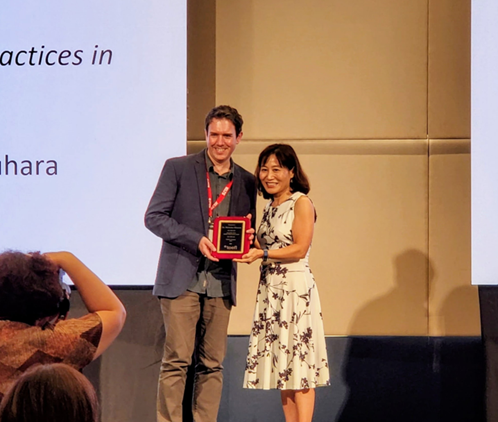20/06/2025
Cambridge University Press & Assessment’s Dr Nick Glasson has won the Jacqueline Ross TOEFL Dissertation Award for his doctoral dissertation in the field of language assessment.

Nick, a Senior Research Manager at Cambridge English, was presented with the award at this year’s Language Testing Research Colloquium (LTRC) a major conference for language assessment professionals held in Bangkok. The award recognises doctoral dissertations that go above and beyond in the field of second and foreign language testing.
Driving innovation in the field of online learning
Nick, a PhD graduate from the University of Bedfordshire, explored how people interacted in an online discussion task. His award-winning dissertation shines a light on the importance of interactional skills - the subtle yet observable ways learners use language to steer conversations and express themselves.
Through studying online group discussions, Nick found that learners often use everyday phrases like “I mean” to clarify, correct, or manage conversations. These small but powerful interactional practices, he argues, are key to building real-world communication skills and reflect how L1 speakers use such practices.
His dissertation ‘Left to their own devices: Exploring interactional practices in an online group speaking task’ – was described as a ‘model of academic excellence’ from the external selection committee.
“It was a wonderful surprise to win such a prestigious award,” commented Nick from Cambridge University Press & Assessment. He continued: “When learning a language, interactional skills are fundamental because it’s through interaction we achieve things on a daily basis. The fact this task was delivered entirely online and with relatively little effort points to how we might develop a greater focus on interactive tasks in future perhaps."
Other key takeaways from LTRC
The LTRC is the annual conference organised by the International Language Testing Association (ILTA). The event brought together professionals from the education, academic, and corporate sectors to discuss language assessment in different multicultural contexts. Cambridge experts were out in full force presenting and engaging in discussions on some of the big topics for language assessment today.
This included contributions on the impact AI and other digital tech is having on language assessment, the importance of integrating learning and assessment in the classroom, the key role of business English skills in increasing employability, and the challenges and opportunities around English for healthcare workers.
Notes
The full list of contributions from Cambridge at LTRC were:
Evaluating the integration of listening comprehension in paired oral communication tests
Leyla Karatay
Exploring cultural and pragmatic challenges in AI-mediated speaking assessments
Yasin Karatay, Leyla Karatay
The effects of automated writing evaluation (AWE) on EFL students’ IELTS writing
Nick Saville
Implementing learning oriented assessment at an institutional level: Key considerations and challenges for its validity
Angeliki Salamoura
Impact and fairness of retaking single IELTS test components: Global perspectives and local impacts in Asia
Hye-won Lee
Assessing business English competence: The role of Linguaskill Business test in multicultural contexts
Aynur Ismayilli Karakoc
The social impact of tests: A multi-stakeholder evaluation of introducing OET in the UK
Brigita Seguis
An evidence- and consensus-based approach to ethical AI for language assessment
Carla Pastorino-Campos
Perspectives and current priorities – What are the benefits of collaboration between the associations?
Nick Saville
Automated language assessment SIG
Yasin Karatay & Hye-won Lee